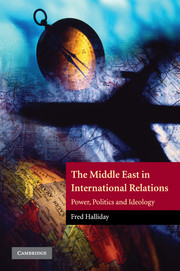Book contents
- Frontmatter
- Contents
- List of maps
- List of tables
- Acknowledgements
- Introduction: world politics, the Middle East and the complexities of area studies
- Part I Concepts, regions and states
- 1 International Relations theory and the Middle East
- 2 The making of foreign policy: states and societies
- Part II History
- Part III Analytic issues
- Part IV Conclusion
- Appendices
- Select bibliography
- Index
2 - The making of foreign policy: states and societies
Published online by Cambridge University Press: 05 September 2012
- Frontmatter
- Contents
- List of maps
- List of tables
- Acknowledgements
- Introduction: world politics, the Middle East and the complexities of area studies
- Part I Concepts, regions and states
- 1 International Relations theory and the Middle East
- 2 The making of foreign policy: states and societies
- Part II History
- Part III Analytic issues
- Part IV Conclusion
- Appendices
- Select bibliography
- Index
Summary
One trap we must avoid is seeing older forms of political organisation and action as direct re-enactments of their forbears. Tribe and tribal loyalty in the twentieth-century Middle East are qualitatively different from their seventeenth- or eighteenth-century antecedents. So too are sects, ethnic groups, families, and coteries. What has changed momentously is the degree of state and market penetration into all sectors of Middle Eastern society. Just as economic subsistence is a thing of the past, so too is political isolation.
Alan Richards and John Waterbury, A Political Economy of the Middle East, second edition, London: Westview Press, 1988Starting with the state
‘The politics of the countries of the Middle East and North Africa bear testimony not to the enfeeblement or the crisis of the state, but rather to its resilience as a form of organization and as an imaginative field.’ Thus writes Dr Charles Tripp, one of the most learned and astute of contemporary political sociologists writing on the region. The central institution for understanding politics, and hence international relations, is, it has been argued, the state. This is the institution that administers and coerces the peoples and territories over which it rules and over which it claims supreme authority, sovereignty. Politics are first and foremost not about oppositions, but about the state's ability to control challenges from within and without, and to meet the expectations of its peoples, including, in modern times, that of representing the wishes of the people, if only in the field of standing up to the outside world.
- Type
- Chapter
- Information
- The Middle East in International RelationsPower, Politics and Ideology, pp. 41 - 72Publisher: Cambridge University PressPrint publication year: 2005

